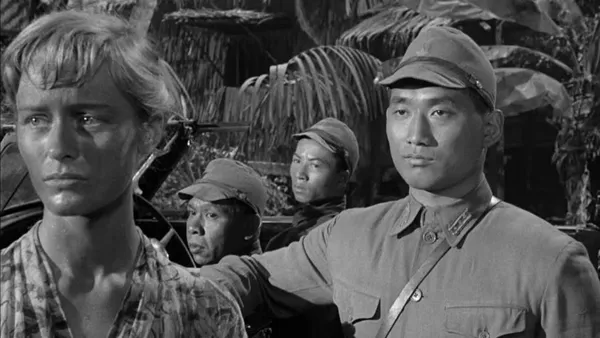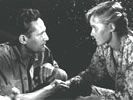Eye For Film >> Movies >> A Town Like Alice (1956) Film Review

This was the most successful British film of 1956. Its popularity has not diminished, as it turns up on television at regular intervals. You can see why. Everything the British Empire once stood for is here - grit, courage, fair play, indomitability, initiative and lips that stay stiff without artificial aids.
Virginia McKenna, with her blonde boy's haircut, became the nation's sweetheart. Young men looked up to her with respect, rather than lust. Once the English rose, she became a symbol of defiance against the forces of evil. Her integrity was not for sale. Two years later she made Carve Her Name With Pride and her position as the saint of J Arthur Rank studios was assured. In addition, with those high cheekbones and that generous mouth, she was impossibly beautiful.

Based on the first part of Nevil Shute's novel, the film recreates what really happened to a group of British women and children after the Japanese occupied Malaya in World War Two. Their husbands were rounded up and sent in lorries to concentration camps. The scenes of parting are poignant in their nostalgia for unformed emotional expression. "Goodbye, you old stick-in-the-mud," one tearful wife bleats.
The women and children are told to walk, but every time they reach a camp, or prisoners' collection point, are told there is no room and must move on. For four months, they stagger across the country and back, covering hundreds of miles. Many die on the way. They meet up with a couple of jolly Aussies, who are PoWs with transport duties, which means they drive a truck instead of building a bridge over a river. One of these is Joe (Peter Finch), who comes from a cattle station outside Alice Springs, and when he meets Jean (McKenna) on the road, it's love at first sight. Same with her. She comes back to the shack where the women are resting overnight and announces the unforgettable lines, "He talked about a town called Alice. He made it sound... alright." The pause still leaves a lump in the throat.
At first, the staccato dialogue, issued from the mouths of officers and gentlemen, gives the impression of a spoof. Did people really talk like that, as if words were weapons against emotion? Some of the ladies have the ramrod authority that gave the Empire its confidence. You grow to accept their attitude and their diction. This is a film about courage, not manners. Sweat pours, mud splatters, blood seeps and children die.
Made during the spate of British war movies, in which Kenneth More, John Mills and Richard Todd did a dashed fine job, A Town Like Alice is different. It's about women, for a start, and director Jack Lee is not afraid to rub their faces in the filth. Such realism, that appears commonplace today, was unusual then.
McKenna's performance stands out amongst the powerful support cast. She has a strength of character that perfectly reflects the wartime mood of self-sacrifice and romantic innocence. At moments like these, a kiss is worth a thousand promises. It lasts forever.
Reviewed on: 14 Dec 2001


















